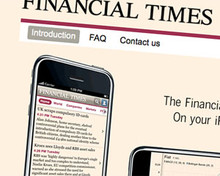
The newspaper mobile sector has seen a 'step change' in the past 18 months he said, with around 200,000 downloads of the FT iPhone app to date.
The FT rejected a paid iPhone app model, like the Guardian's: "We looked at the two models side by side and maybe we could have got away with putting quite a high price point," said Grimshaw.
"But the fact is you only get one hit from that and then after that the revenue stream dries up. We thought it would be much more sensible and favourable to make it part of the subscription model."
The FT receives new subscribers to its tiered system every week because they wanted the app, he added. The iPhone app can be downloaded for free, but non-subscribers are limited to viewing three items per month.
Video and other additional capabilities will also be introduced to the iPhone app in due course, Grimshaw confirmed.
They are also looking at introducing a feature to allow users to subscribe via mobile, rather than needing to visit the site.
Day pass micropayments
Grimshaw, who has outlined micropayment plans in the past, said that a day pass model for access to online and mobile content would be the first step for 2010.
"It's something we think will have a market. It's reasonable to assume there are a lot of people who will quite happily pay that, but aren't willing to commit to one year's subscription in one go."
Pay-per-article would be a "step beyond," he said: "[The] technology is coming though to allow us to actually charge per article. Later in 2010 we ought to be in a position to be able to do that but that's quite a big step.
"You're talking about disaggregating an entire proposition so you can literally choose a single part of it - it's a different way of doing business."
User analytics
Monitoring the behaviour of 1.8 million registered users and 121,000 subscribers is a big part of the FT's marketing strategy, he said.
"Their details are in a database: we have a lot of demographic information about them; we're also able to combine that with their normal activity on the website. That data base is a goldmine that brings benefits to many parts of the business."
Specific advertising can be exposed to a certain audience and direct communication can be made by email, he said. "1.8 million users have self-selected as people who are interested in our content and our business," he added. "It is an area where there are enormous benefits to be gained."
He argued that privacy is not infringed by the publication's methods: "We never focus on behaviour of particular individuals: we are always looking at things in aggregate; how a sector of our database of users behaves.
"We would never allow an advertiser access to that [user information]. That would be both unacceptable and illegal."
The success of companies like Amazon was due to carefully targeted marketing, he said:
"Some of the most successful companies out there have built their businesses by understanding the behaviour of their users in a very defined way; using their insight to develop their business decision making."
Free daily newsletter
If you like our news and feature articles, you can sign up to receive our free daily (Mon-Fri) email newsletter (mobile friendly).
Related articles
- Five key takeaways from the UK select committee on the future of news
- Intensive AI training by FT Strategies and GNI open for applications
- From Reuters to The New York Times, Big Oil pays 'most trusted media brands' to push greenwashing
- How the Financial Times is broadening its portfolio
- Why newsroom transformation is key to subscription growth









